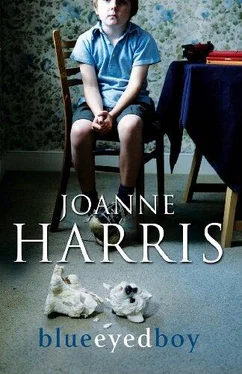Of course, I should have known that sooner or later she would find out. With friends like Eleanor Vine, her net covers all of Malbry. Besides, I quite enjoy my class, which gives me the chance to disseminate all kinds of misinformation —
‘Besides, it helps you cope with stress.’
If only you knew, Ma.
‘OK, I’ll go.’
You are viewing the WebJournal of blueeyedboy.
Posted at: 01.44 on Wednesday, January 30
Status: restricted
Mood: creative
Listening to: Breaking Benjamin: ‘Breath’
Most accidents occur in the home. I’m guessing that’s how I came about; one of three boys, all born within five years. Nigel, then Brendan, then Benjamin, though by then she’d stopped using our real names, and I was always B.B.
Benjamin . It’s a Hebrew name. It means Son Of My Right Hand . Not so very flattering, really, when you consider what guys actually do with their right hand. But then, the man we knew as Dad was hardly a dutiful father. Only Nigel remembered him, and then only as a series of vague impressions: a big voice; a rough face; a scent of beer and cigarettes. Or maybe that’s memory doing what it does sometimes, filling in the gaps with plausible detail while the rest turns over in darkness, like a spindle laden with black sheep’s wool.
Not that Nigel was the black sheep — all of that came later. But he was destined to always wear black, and with time, it affected his character. Ma worked as a cleaner in those days: dusting and vacuuming rich people’s homes, doing their laundry, ironing their clothes, washing their dishes and polishing their floors. Time spent on our own house was unpaid work, and so of course it took second place. Not that she was slovenly. But time was always an issue with her, and had to be saved at every turn.
And so, with three sons so close to each other in age and so much laundry to do every week, she hit upon an ingenious system. To ensure that items could be easily identified, she allocated to each of her sons a colour, and bought our clothes accordingly from the local Oxfam shop. Thus Nigel wore shades of charcoal, even down to his underwear; Brendan always wore brown and Benjamin —
Well, I’m sure you can guess.
Of course, it never crossed her mind what such a decision might do to us. Colours make a difference; any hospital worker can tell you that. That’s why the cancer unit in the hospital where I work is painted in cheery shades of pink; the waiting rooms in soothing green; the maternity wards in Easter-chick yellow —
But Ma never really understood the secret power of colours. To Ma, it was just a practical means of sorting laundry. Ma never asked herself what it might be like to have to wear the same colour day in, day out: boring brown or gloomy black or beautiful, wide-eyed, fairy-tale blue —
But then, Ma always was different. Some boy’s mothers are sugar and spice. Mine was — well — she was something else.
Born Gloria Beverley Green, the third child of a factory girl and a steelworker, Ma spent her childhood in Malbry town, in the maze of little brick terraces known locally as Red City. Washing strung across the streets; soot on every surface; cobbled alleyways leading to nothing but blind and litter-lined spray-painted walls.
Ambitious even then, she dreamed of far pavilions, distant shores and working girls rescued by millionaires. Even now, Ma believes in true love, in the lottery, in self-help books, in boosting your word power, in magazine columns and agony aunts and TV advertisements in which the floors are always clean and women always worth it —
Of course, she was neither imaginative nor particularly bright — she left school with only five CSEs — but Gloria Green was determined enough to compensate for her failings, and instead turned all of her considerable willpower and energy towards finding a means of escape from the grime and small-mindedness of Red City into that TV world of clean babies and shiny floors and numbers that can change your life.
It wasn’t easy, keeping the faith. Red City was all she had ever known. A rat trap, that lures you in, but seldom lets you out again. Her friends all married in their teens; found jobs, had kids. Gloria stayed with her parents, helping her mother keep house and waiting day after tedious day for a prince who never came.
Finally she gave in. Chris Moxon was a friend of her dad’s; he ran a fish-and-chip shop and lived on the edge of White City. He wasn’t exactly Catch of the Day — being older and balder than she’d planned — but he was kind and attentive, and by then she was getting desperate. She married him at All Saints’ Church in white tulle and carnations, and for a while she almost believed that she had somehow escaped the rat trap —
But she found that the smell of frying fat crept into everything she owned — her dresses, her stockings, even her shoes. And however many Marlboros she smoked, however much scent she dabbed on to her skin, there was always that stink — his stink — underlying everything; and she realized that she hadn’t escaped the rat trap, she had simply fallen deeper inside.
Then she met Peter Winter at a Christmas party later that year. He worked at a local car dealership and drove a BMW. Heady stuff for Gloria Green, embarking on her first affair with the coolness of a professional poker player. Certainly, the stakes were high. Gloria’s Pa thought the world of Chris. But Peter Winter looked promising: he was solvent, ambitious, untroubled, unwed. He spoke of moving out of White City; of finding a house in the Village, perhaps —
It was good enough for Gloria. She made him her personal project. Within twelve months she was divorced, and pregnant with her first child. She swore that the boy was Peter’s, of course, and when she was able, she married him, in spite of her family’s protests.
This time, there was no fanfare. Gloria had shamed them all. No one attended the ceremony, which was held on a dismal November day at the local Register Office. And when things started to fall apart — when Peter started drinking, when the dealership went broke — Gloria’s parents refused to back down, or even to see the little boy that she’d named after her father —
But Gloria was undaunted. She took an evening job in town, as well as her daily cleaning shift; and when she became pregnant again she hid it, wearing a girdle right up until the eighth month, so that she could keep earning money. When her second son was born she took in mending work and ironing too, so that the house was always filled with the steam and the smell of other people’s washing. The dream of a house in the Village had become increasingly remote; but at least in White City there were schools, and a park for the kids, and a job at the local laundrette. Things looked good for Gloria, and she faced her new life with optimism.
But two years of unemployment had wrought a change in Peter Winter. Once a charmer, now he’d grown fat, spending his days in front of the TV, smoking Camels and drinking beer. Gloria was carrying him, much to her resentment; and unbeknownst to her, by then she was pregnant once again.
I never knew my real father. Ma seldom spoke of him. He was handsome, though. I have his eyes. I think Gloria secretly thought that he might turn out to be her ticket out of White City. But Mr Blue Eyes had other ideas, and by the time Ma learnt the truth, her ship had sailed for sunnier shores, leaving her to weather the storm.
No one knows how Peter found out. Perhaps he saw them together somewhere. Perhaps someone talked. Perhaps he just guessed. But Nigel remembered the night he left — or at least, he said he did, though he can’t have been five years old at the time. A night of broken crockery, of shouted oaths, of insults — and then the sound of the car starting, the slammed door, the squeal of rubber on the road — a sound that to me always conjures up the smell of fresh popcorn and cinema seats. Then, later, the crash, the broken glass, the howl of sirens in the air —
Читать дальше










![Джоанн Харрис - Джентльмены и игроки [litres]](/books/419804/dzhoann-harris-dzhentlmeny-i-igroki-litres-thumb.webp)

